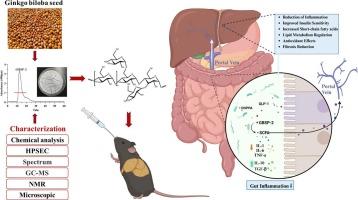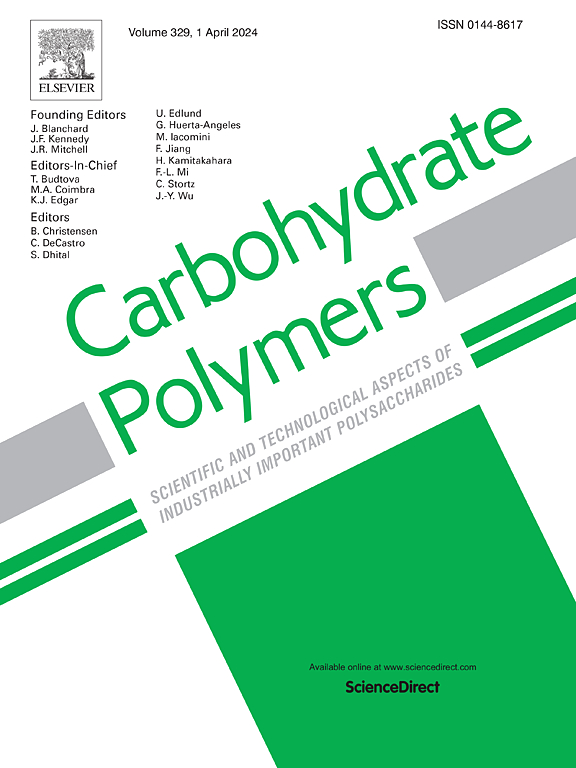银杏叶籽中α-d-葡聚糖的结构特征及其对小鼠非酒精性脂肪肝的保护作用
IF 12.5
1区 化学
Q1 CHEMISTRY, APPLIED
引用次数: 0
摘要
非酒精性脂肪肝(NAFLD)是全球公共卫生面临的巨大挑战,但它有望通过植物多糖得到改善。银杏叶种子长期以来一直被用作药物和食品,对各种慢性疾病具有潜在的益处。然而,银杏叶多糖对非酒精性脂肪肝的保护作用仍不明确。在这项研究中,我们从银杏叶种子中分离纯化了多糖(GBSP-2)。GBSP-2由α-d-吡喃葡萄糖残基组成,α-d-吡喃葡萄糖单位之间以(1→4)键、(1→4,6)键和(1→3,4)键连接,比例分布为15:1:1。通过研究小鼠模型,我们考察了 GBSP-2(100 或 200 mg/kg)对高脂饮食诱发的非酒精性脂肪肝的影响。结果表明,GBSP-2 能显著缓解非酒精性脂肪肝,具体表现为减轻肝脏脂肪变性、减少炎症反应、改善氧化应激和糖脂代谢紊乱。此外,GBSP-2 还能缓解非酒精性脂肪肝小鼠肠道微生物群的紊乱,显著增加 Akkermansia、Romboutsia、Lactobacillus 和 Bacteroides 的丰度。从机制上讲,GBSP-2 可激活 AMPK/ACC 信号通路,通过生成 3,4-二羟基苯丙酸(DHPPA)来抑制脂质合成。总之,这些研究结果表明,GBSP-2 在通过肠肝轴改善非酒精性脂肪肝方面发挥着多渠道、多靶点的作用。本文章由计算机程序翻译,如有差异,请以英文原文为准。

Structural characterization of a α-d-glucan from Ginkgo biloba seeds and its protective effects on non-alcoholic fatty liver disease in mice
Nonalcoholic fatty liver disease (NAFLD) poses a great global challenge to public health, yet it holds promise for amelioration through plant-derived polysaccharide. Ginkgo biloba seeds have long been used as medicine and food, which has potential benefits for various chronic diseases. However, the protective role of Ginkgo biloba seed polysaccharide against NAFLD remains unclear. In this study, we isolated and purified polysaccharide (GBSP-2) from Ginkgo biloba seeds. GBSP-2 is composed of α-d-glucopyranose residues, which are interconnected with α-d-glucopyranose units linked by (1→4) bonds, (1→4,6) bonds and (1→3,4) bonds, the ratio distribution is 15:1:1. By studying a mouse model, we investigated the effect of GBSP-2 (100 or 200 mg/kg) on high-fat-diet-induced NAFLD. We demonstrated that GBSP-2 significantly alleviated NAFLD, as evidenced by reduced hepatic steatosis, decreased inflammation, improved oxidative stress and ameliorative glucolipid metabolic disorders. Furthermore, GBSP-2 mitigated gut microbiota disturbance of NAFLD mice and markedly increased the abundance of Akkermansia, Romboutsia, Lactobacillus and Bacteroides. Mechanistically, GBSP-2 could activate AMPK/ACC signaling pathway to inhibit lipid synthesis by generating 3,4-dihydroxyphenylpropionic acid (DHPPA). Overall, these findings suggest that GBSP-2 plays a multi-channel and multi-target role in improving NAFLD through the gut-liver axis.
求助全文
通过发布文献求助,成功后即可免费获取论文全文。
去求助
来源期刊

Carbohydrate Polymers
化学-高分子科学
CiteScore
22.40
自引率
8.00%
发文量
1286
审稿时长
47 days
期刊介绍:
Carbohydrate Polymers stands as a prominent journal in the glycoscience field, dedicated to exploring and harnessing the potential of polysaccharides with applications spanning bioenergy, bioplastics, biomaterials, biorefining, chemistry, drug delivery, food, health, nanotechnology, packaging, paper, pharmaceuticals, medicine, oil recovery, textiles, tissue engineering, wood, and various aspects of glycoscience.
The journal emphasizes the central role of well-characterized carbohydrate polymers, highlighting their significance as the primary focus rather than a peripheral topic. Each paper must prominently feature at least one named carbohydrate polymer, evident in both citation and title, with a commitment to innovative research that advances scientific knowledge.
 求助内容:
求助内容: 应助结果提醒方式:
应助结果提醒方式:


